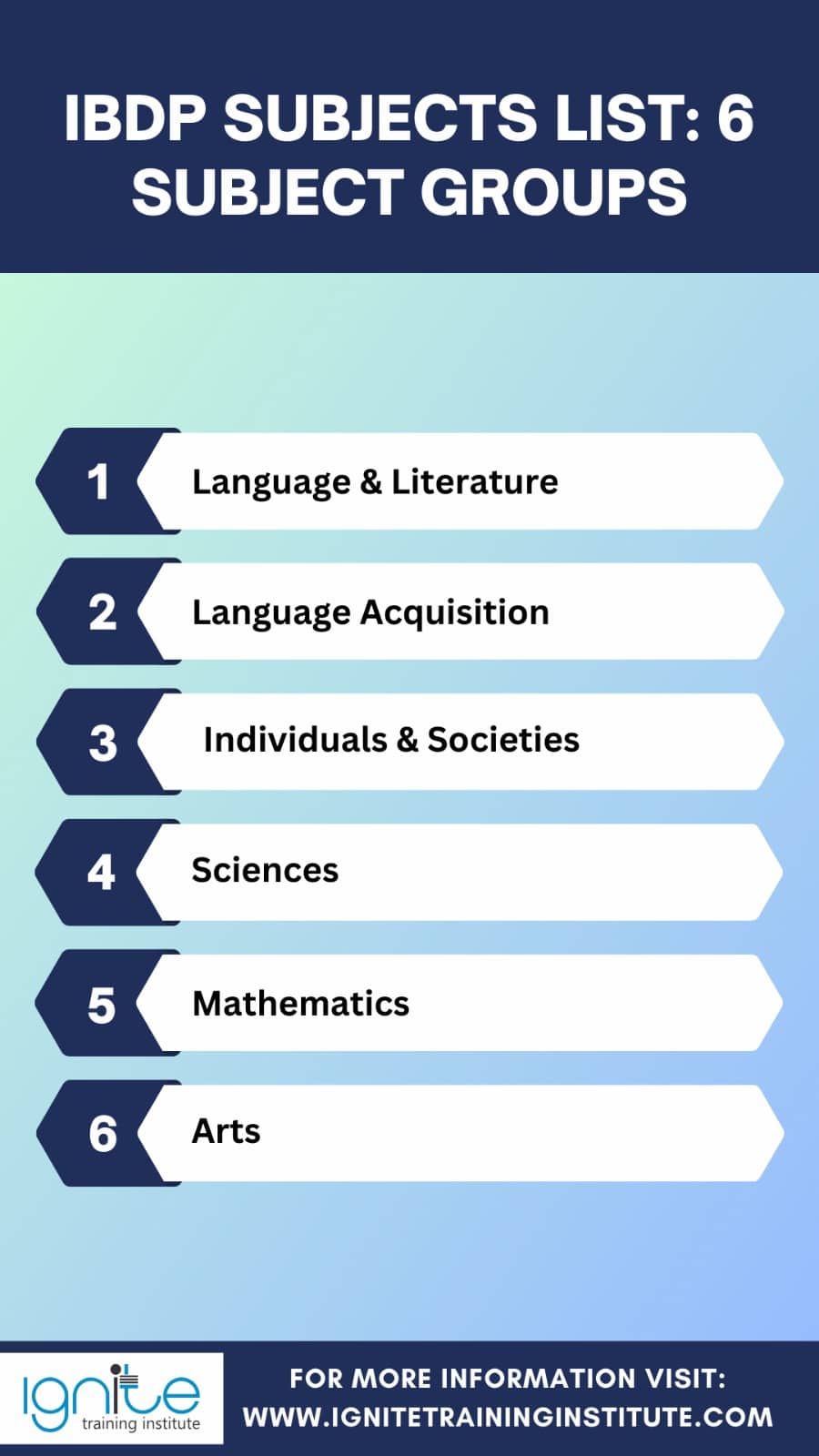Embarking on the challenging yet rewarding journey of the International Baccalaureate Diploma Programme (IBDP) demands a nuanced understanding of its diverse array of subjects. In this blog, we unravel the intricacies of IBDP subjects, exploring the unique demands, key concepts, and effective study strategies across disciplines. From the literature-rich Language A courses to the analytical challenges of Sciences and Mathematics, each subject contributes to the holistic development of students.
Moreover, if you’re in Dubai seeking expert guidance, Ignite Training Institute stands as the beacon for IBDP tutoring excellence. Our seasoned tutors, well-versed in the curriculum’s nuances, provide comprehensive support, ensuring students not only grasp the content but also excel in their academic pursuits. Join us as we delve into the academic tapestry of IBDP subjects and discover how Ignite Training Institute in Dubai is committed to nurturing your success in this globally recognized program.
IBDP Subjects Groups Key Features

Navigating the International Baccalaureate Diploma Programme (IBDP) involves understanding its subject groups, each offering unique insights and opportunities for students. Here’s a concise overview of IBDP subject groups and their key features:
Group 1: Studies In Language & Literature
The curriculum encompasses a diverse selection of texts, fostering students’ profound understanding of the intricacies, richness, and nuances inherent in the chosen language across various contexts. Participants engage in courses aligned with their academic proficiency in a specific language.
1. Language A: Literature: With automatic accessibility in 55 languages, this course ensures a global exploration of literary traditions. Special requests accommodate languages with rich literary traditions, fostering a comprehensive study of diverse cultural narratives and expressions.
2. Language A: Language And Literature: Offered in 17 languages, this course integrates linguistic analysis with literary study, providing a multifaceted understanding of language’s role in shaping literary expression. Students engage in a nuanced exploration of cultural nuances through the dynamic interplay of language and literature.
3. Literature & Performance: Automatically provided in English, this course immerses students in the performative dimensions of literature, emphasizing its dynamic nature. Special requests for Spanish and French broaden the cultural scope, allowing students to delve into the rich traditions of literature and performance in these languages.
Group 2: Language Acquisition
The focal point of modern language courses centers on acquiring and applying language skills across diverse contexts and purposes, concurrently fostering cultural understanding through language study.
To cater to students’ diverse interests and prior language study experience, three subjects are available, with the first two being offered in multiple languages:
1. Language AB Initio Courses: Tailored for beginners, these courses cater to students with minimal or no prior experience in the chosen language. These introductory courses are exclusively available at the standard level.
2. Language B Courses: Geared towards students with some prior language learning experience, these courses offer flexibility by allowing study at either higher or standard levels. This accommodates varying proficiency levels and encourages a deeper exploration of language and culture.
3. Classical Languages: Explore ancient Rome and Greece through languages, literatures, and cultures. Designed for higher education, the course fosters an appreciation for diverse perspectives via the study of original language texts.
Group 3: Individuals & Societies
Students must select a subject from each of the six academic areas, with one being from Individuals and Societies. Additionally, they can choose a second subject from each academic area except for the arts.
1. Business Management: Explore business management theories and apply tools and techniques for practical understanding.
2. Economics: Dive into the complexities and interdependence of economic activities within our rapidly changing world.
3. Geography: Gain insights into the intricate relationships and interdependence of economic activities in our dynamic global landscape.
4. Global Politics: Develop an understanding of political dimensions at local, national, international, and global levels. Explore political issues impacting personal lives.
5. History: Embark on an exploratory journey that fosters inquiry, interpretive skills, and a profound understanding of the past, human nature, and today’s world.
6. Digital Society: Engage with an inquiry framework and skills toolkit to navigate digital systems, explore impacts, reflect on emerging trends, and share discoveries.
7. Philosophy: Address abstract questions rooted in everyday experiences, utilizing critical and systematic thinking to deepen understanding and formulate responses.
8. Psychology: Examine the interplay of biological, cognitive, and sociocultural influences on human behavior. Develop insights into psychological knowledge and its applications, fostering an appreciation for human diversity.
9. Social & Cultural Anthropology: Appreciate how anthropology contributes to understanding contemporary issues such as war, conflict, the environment, poverty, injustice, inequality, and human and cultural rights. Gain critical insight into social change and the development of societies while challenging cultural assumptions.
10. World Religions (SL Only): Embark on a systematic, analytical, yet empathetic study of beliefs and practices in nine main world religions. Promote awareness of religious issues through scholarly, open-minded, and objective exploration.
Group 4: Sciences
Students engage with the foundational aspects of each subject, immersing themselves in the exploration of concepts, theories, models, and techniques to deepen their understanding of the scientific method.
1. Biology: Delving from the molecular intricacies of cells to the functioning of entire ecosystems, with ongoing anticipation of significant discoveries in the 21st century.
2. Computer Science: A disciplined focus on rigorous and practical problem-solving, with curriculum and assessment designed to highlight key features and benefits.
3. Chemistry: An experimental science that seamlessly blends academic study with the acquisition of practical and investigational skills.
4. Design Technology: Aiming to cultivate internationally-minded individuals, nurturing an enriched understanding of design and the technological realm. Encourages a sense of shared guardianship of the planet for a better world.
5. Physics: Providing diverse opportunities for students to design investigations, enhance manipulative skills, and collaborate on the analysis of results. Emphasizes independent and collaborative work, mirroring real-world scientific research practices.
6. Sports, Exercise, & Health Science (SEHS): Incorporating a mandatory group 4 project, encouraging collaboration and interdisciplinary exploration. This provides students with a platform to address global questions through scientific solutions.
Group 5: Mathematics
Students are urged to value the global dimensions of mathematics and the diverse cultural and historical perspectives it encompasses. In all DP mathematics courses, students are expected to recognize and appreciate the integration of technology in mathematical applications.
- Analysis And Approaches
- Applications And Interpretation
Starting from August 2019, students have the option to choose from the following Mathematics courses, with their first assessment scheduled for May 2021:
- Mathematics: Analysis and Approaches SL
- Mathematics: Analysis and Approaches HL
- Mathematics: Applications and Interpretation SL
- Mathematics: Applications and Interpretation HL
Students are allowed to enroll in only one mathematics course as part of their diploma. These courses cater to the diverse needs, interests, and abilities of students, aligning with various university and career aspirations. The overarching aims of these courses are to foster the development of mathematical knowledge, enhance logical and critical thinking skills, and refine powers of abstraction and generalization. Additionally, students are encouraged to gain an appreciation for the international dimensions of mathematics and its diverse cultural and historical perspectives.
Group 6: Arts
Each discipline is meticulously crafted to nurture a mindset of critical reflection and informed practice. These subjects aim to facilitate an understanding of the ever-evolving and dynamic nature of the arts, encouraging students to delve into the rich diversity of artistic expressions across various periods, locations, and cultures. Ultimately, the goal is to empower students to confidently and competently articulate themselves within the realm of the arts.
1. Dance: This course centers on the creation, performance, and analysis of expressive movement, a practice found across diverse cultures globally, serving various purposes.
2. Music: The DP Music course shapes students into well-rounded contemporary musicians, blending practical work, theoretical and technical training, and the cultivation of creative competencies.
3. Film: Emphasizing collaborative work, the film course explores the international and intercultural dynamics influencing contemporary cinema. It instills an appreciation for film’s evolution across time, space, and cultures, challenging students to embrace alternative perspectives and respect the diversity within the film industry.
4. Theatre: A practical subject promoting discovery through experimentation, risk-taking, and the presentation of ideas. It not only enhances theatre skills but also fosters life skills, building confidence, creativity, and collaborative work.
5. Visual Arts: Integral to everyday life, the visual arts permeate human creativity, expression, communication, and understanding at all levels.
Related: IBCP VS IBDP: 5 Differences To Make An Informed Choice
IBDP Core Components: EE, TOK, CAS
The International Baccalaureate Diploma Programme (IBDP) stands as a holistic educational framework, and at its core lie three essential components that shape the students into well-rounded individuals. These core elements are integral to the IBDP experience, fostering critical thinking, personal development, and a global perspective.
1. Extended Essay (EE)
The Extended Essay is a cornerstone of the IBDP, challenging students to engage in independent research on a topic of their choice. This substantial piece of academic writing, up to 4,000 words in length, encourages students to explore their passions and develop essential research and writing skills. From selecting a focused research question to conducting thorough investigations, the EE prepares students for the rigorous demands of higher education.
2. Theory Of Knowledge (TOK)
TOK is a unique course that prompts students to question the nature of knowledge itself. Encouraging critical thinking and reflection, TOK explores the foundations of beliefs, biases, and how knowledge is constructed. Students delve into the complexities of different areas of knowledge, examining how they shape our understanding of the world. TOK culminates in an essay and a presentation, providing students with an opportunity to showcase their intellectual growth and analytical abilities.
3. Creativity, Activity, Service (CAS)
CAS is a dynamic component that encourages students to balance academic pursuits with personal development and community engagement. Through a blend of creative activities, physical pursuits, and service initiatives, students develop a sense of responsibility and a well-rounded skill set. CAS extends beyond the classroom, fostering empathy, leadership, and a commitment to making a positive impact on the world.
Together, these core components of the IBDP empower students to become critical thinkers, compassionate individuals, and globally aware citizens, laying the foundation for success in both higher education and life beyond the academic realm.
Related: 2023 Latest Review: Top 8 IBDP Schools In Dubai, UAE
How To Choose IBDP Subjects?
Choosing the right International Baccalaureate Diploma Programme (IBDP) subjects is a crucial step in tailoring your academic journey to align with your interests and future goals. The subject groups encompass studies in language and literature, language acquisition, individuals and societies, sciences, mathematics, and the arts, providing a diverse range of options. To make an informed decision, consider your passions, career aspirations, and the prerequisites for your desired university programs.
Students have the flexibility to opt for an additional sciences, individuals and societies, or languages subject in lieu of a subject in the arts, allowing for a personalized academic profile. It’s vital to strike a balance between Higher Level (HL) and Standard Level (SL) subjects, considering the differences in scope and depth. While both are assessed using the same grade descriptors, HL subjects demand a more extensive knowledge base and skill set, requiring 240 teaching hours compared to SL’s 150.
Ensure a well-rounded curriculum by taking a minimum of three and a maximum of four subjects at HL, with the remaining subjects at SL. This thoughtful selection process not only reflects your academic strengths but also sets the stage for a rewarding and successful IBDP experience.
Related: IB Diploma Programme Explained: An IBDP Informational Guide
Effective Study Techniques To Score Well In The IBDP Subjects
Mastering the International Baccalaureate Diploma Programme (IBDP) requires not only academic prowess but also effective study techniques. Here are five pointers to help you score well in your IBDP subjects:
1. Organized Time Management
Efficient time management is crucial for success in the IBDP. Create a detailed study schedule that allocates sufficient time to each subject, considering your strengths and weaknesses. Prioritize tasks based on deadlines and importance, ensuring that you cover all subjects consistently. Divide larger tasks into smaller, more manageable segments to prevent a sense of being overwhelmed.
2. Active Learning Strategies
Move beyond passive reading and engage in active learning. Utilize techniques such as summarization, self-quizzing, and teaching the material to others. Actively participating in discussions, solving practice questions, and creating flashcards can enhance your understanding and retention of complex concepts. This hands-on approach fosters a deeper connection with the material and better prepares you for assessments.
3. Effective Note-Taking Techniques
Develop a system for effective note-taking that suits your learning style. Whether it’s mind maps, Cornell notes, or a combination of methods, choose a format that helps you organize information logically. Highlight key points, concepts, and examples. Review and revise your notes regularly to reinforce your understanding and identify areas that may need further clarification.
4. Utilize Online Resources & Past Papers
Take advantage of the wealth of online resources available for IBDP subjects. Explore educational websites, video lectures, and interactive simulations to supplement your learning. Additionally, practicing with past papers is an invaluable strategy. Familiarize yourself with the exam format, time constraints, and types of questions asked. Analyze your performance to identify areas of improvement and adjust your study focus accordingly.
5. Collaborate & Seek Support
Don’t hesitate to collaborate with your peers and seek support from teachers or online forums. Group study sessions can offer diverse perspectives and insights into challenging topics. Explaining concepts to others not only reinforces your understanding but also helps you identify gaps in your knowledge. When facing difficulties, reach out for assistance promptly to ensure you stay on track with your studies.
Related: 10 IB Learner Profile Attributes Shaping Your Future
Ignite Training Institute: Best IBDP Tutors In Dubai, UAE
Ignite Training Institute stands out as the premier destination for International Baccalaureate Diploma Programme (IBDP) tutoring in Dubai, UAE. With a commitment to academic excellence and personalized guidance, Ignite takes pride in being the go-to institute for students seeking top-notch IBDP support. Our team of experienced tutors, well-versed in the intricacies of the IBDP curriculum, ensures that students receive tailored assistance to navigate the challenges of their chosen subjects.
From comprehensive exam preparation to an in-depth understanding of core components such as Extended Essay, Theory of Knowledge, and Creativity, Activity, and Service (CAS), Ignite Training Institute is dedicated to fostering a learning environment that propels students toward success in their IBDP journey. Choose Ignite for unparalleled expertise, individualized attention, and a pathway to academic achievement in the heart of Dubai.
Related: Leading IB Tutors In Dubai For MYP & IBDP: Know Everything
FAQs
1. How Many Subjects Are There In IBDP?
The International Baccalaureate Diploma Programme (IBDP) typically consists of six subjects.
2. What Is The IBDP Curriculum?
The IBDP curriculum is a comprehensive educational program that includes a range of subjects, core components, and assessments designed to foster international-mindedness and holistic development.
3. How To Choose Subjects In IBDP?
To choose subjects in IBDP, consider your academic strengths, interests, and future career aspirations, aiming for a well-rounded combination across six subject groups.
Conclusion

In conclusion, the International Baccalaureate Diploma Programme (IBDP) subjects offer a challenging yet enriching educational experience, equipping students with a broad knowledge base, critical thinking skills, and a global perspective essential for future success in both academia and life.
Related: Top Colleges That Accept IB Diploma In The USA, UK, & UAE


